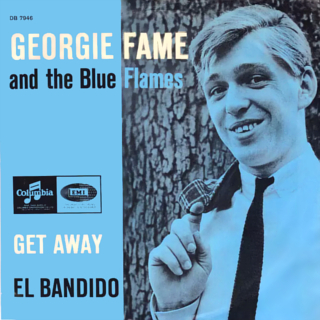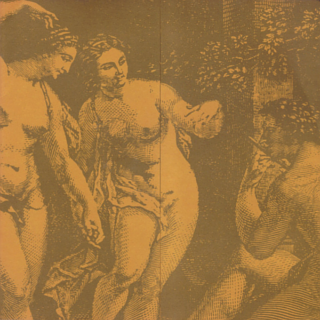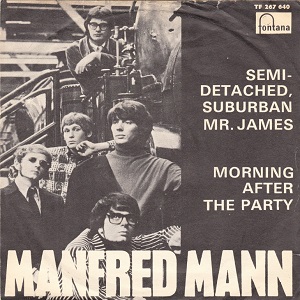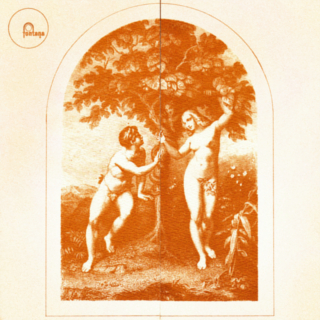
Are You Experienced is the debut studio album by the Jimi Hendrix Experience, released in May 1967. The album was an immediate critical and commercial success, and is widely regarded as one of the greatest albums of all time. It features Jimi Hendrix's innovative approach to songwriting and electric guitar playing, which soon established a new direction in psychedelic and rock music as a whole.

Alan Price is an English musician who first found prominence as the original keyboardist of the English rock band the Animals. He left the band in 1965 to form the Alan Price Set; his hit singles with and without the group include "Simon Smith and the Amazing Dancing Bear", "The House That Jack Built", "Rosetta" and "Jarrow Song". Price is also known for work in film and television, taking occasional acting roles and composing the soundtrack of Lindsay Anderson's film O Lucky Man! (1973). He was inducted into the Rock and Roll Hall of Fame in 1994 as a member of the Animals.

"Happy Together" is a song written by Garry Bonner and Alan Gordon and recorded by American rock band the Turtles. It was released as a single, backed with (b/w) "Like the Seasons", in January 1967, and peaked at number one on the US Billboard Hot 100, becoming the band's first and only chart-topper there. It also reached the top 20 in various countries, including number 2 in Canada and number 12 in the UK. It was later included on the Turtles' third studio album Happy Together (1967).
The Tornados were an English instrumental rock group of the 1960s that acted as backing group for many of record producer Joe Meek's productions and also for singer Billy Fury. They enjoyed several chart hits in their own right, including the UK and US no. 1 "Telstar", the first US no. 1 single by a British group.
The Foundations were a British soul band who were primarily active between 1967 and 1970. The group's background was West Indian, White British and Sri Lankan. Their 1967 debut single "Baby Now That I've Found You" reached number one in the UK and Canada, and number eleven in the US. Their 1968 single "Build Me Up Buttercup" reached number two in the UK and number three on the US Billboard Hot 100. The group was the first multi-racial group to have a number one hit in the UK in the 1960s.

"I Put a Spell on You" is a 1956 song recorded by "Screamin' Jay" Hawkins and officially co-written with Herb Slotkin. The selection became a classic cult song, covered by a variety of artists. It was Hawkins' greatest commercial success, reportedly surpassing a million copies in sales, even though it failed to make the Billboard pop or R&B charts.

"Here Come the Nice" is a song by English rock band Small Faces. Written by guitarist Steve Marriott and bass guitarist Ronnie Lane, it was released as a single on 2 June 1967, through Immediate Records. The song, which was the band's debut on Immediate, was their first promoted release of 1967, following feuds with Decca Records. It marked a distinct turning point for Small Faces' career, being their first single to deliberately venture into psychedelia, though they had previously done that on a few album tracks for Decca. The song's subject regarding a drug dealer somehow bypassed the BBC censors, who did not ban it, which resulted in the song managing to chart at number 12 on the UK Singles Chart during the summer of 1967. The song received mostly good reviews from music critics, with many positively noting the change of genres.

"Evil Hearted You" is a 1965 song by the English rock group the Yardbirds. It was written by future 10cc member Graham Gouldman, who also wrote the group's two prior singles, "For Your Love" and "Heart Full of Soul". It reached No. 3 on the main UK singles chart.

"Simon Smith and the Amazing Dancing Bear" is a song written by Randy Newman, about a young man of modest means who entertains affluent diners with his dancing bear. The Alan Price Set released a version as a double A-side with "Tickle Me" on 24 February 1967, and it reached number four on the Record Retailer chart in Britain. The success brought Newman to public attention as a songwriter; he recorded the song himself for his 1972 album Sail Away.
"Release Me" is a popular song written by Eddie Miller and Robert Yount in 1949. Four years later it was recorded by Jimmy Heap & the Melody Masters, and with even better success by Patti Page (1954), Ray Price (1954), and Kitty Wells (1954). Jivin' Gene Bourgeois & the Jokers recorded the tune in 1960, and that version served as an inspiration for Little Esther Phillips, who reached number one on the R&B chart and number eight on the pop chart with her big-selling cover. The Everly Brothers followed in 1963, along with Lucille Starr including a translation in French (1964), Jerry Wallace (1966), Dean Martin (1967), and Engelbert Humperdinck (1967), whose version reached number one on the UK Singles Chart.

"Get Away" is a song by Georgie Fame and the Blue Flames, written by Georgie Fame. Initially written and recorded for an advertising campaign for petrol, the song was subsequently released on Columbia. It topped the UK Singles Chart for one week in July 1966.

"Matthew and Son" is a song written and released by singer-songwriter Cat Stevens in 1966. Following his discovery by producer and manager Mike Hurst, Stevens debuted professionally in the music business with the release of his single "I Love My Dog" in September 1966. The song's surprising commercial success established his idiosyncratic songwriting style and extended his contract with Deram Records. "Matthew and Son" was musically inspired by a previous song he had written, while the lyrics were inspired by his girlfriend at the time, who worked a lot. Musically, the song is a baroque pop song with both brass and string arrangements while the lyrics tells the tale of the titular company exploiting their timid workers. "Matthew and Son" was recorded on 1 December 1966 at Decca Studios in London with Hurst producing.

"Listen to Me" is a 1968 single by the Hollies, written by Tony Hazzard. It was the last Hollies single of Graham Nash's original tenure in the group. The song reached number 11 on the UK Singles Chart in October 1968 and received praise from critics.

"Ha! Ha! Said the Clown" is a song written by Tony Hazzard, first recorded by British pop group Manfred Mann. Hazzard claims the song "came out of the blue" though he did not demo it for weeks. Following recording a demo, he approached manager Gerry Bron, who liked it enough to want one of his groups, Manfred Mann, to record it. Manfred Mann recorded their version of the single on 10 February 1967 at Philips Studio in Marble Arch, London, together with producer Shel Talmy. It was the second of three singles Manfred Mann recorded to feature the Mellotron.

"From the Underworld" is a single by the English rock band the Herd, released in August 1967. Written by the band's managers Ken Howard and Alan Blaikley, the song's lyrics are based on the ancient Greek myth of Orpheus and Eurydice. It became the band's first hit upon release, reaching number 6 on the UK Singles Chart and launching singer Peter Frampton as a pop star. It was later included on the group's only studio album Paradise Lost (1968).

"When I Come Home" is a song written by Steve Winwood and Jackie Edwards, first recorded by Winwood's band the Spencer Davis Group in 1966. Released as a single that summer, it reached number 12 in the UK Singles Chart. The single received mixed reviews upon release, with Penny Valentine deeming it inferior to their previous singles. The band was featured in the movie The Ghost Goes Gear (1966), miming to the track.

"Semi-Detached, Suburban Mr. James" is a song written by songwriters Geoff Stephens and John Carter, recorded by English pop group Manfred Mann in 1966. Previous to this, it was recorded by the band Herbie's People who were signed to CBS and had recorded other John Carter songs. The original title was "Semi-Detached, Suburban Mr. Jones" and was recorded that way by Herbie's People. Their version was pulled by CBS when Manfred Mann said they would record it. It was subsequently issued but only in the USA on the Okeh label. Stephens and Carter, who were writers for a publishing company on Denmark Street, London, wrote the song in a style different from their usual compositions, as love was not the prevalent theme. Introduced to the song by producer Shel Talmy, Manfred Mann recorded it at Philips Studio in August 1966. Released by Fontana Records on 21 October 1966, the song was backed by drummer Mike Hugg's composition "Morning After The Party" as the group's second single on the label. Keyboardist Manfred Mann plays the Mellotron on the recording; it was one of the earliest recordings featuring the instrument. Following a trend set by Bob Dylan, the song tackles the subject of life in British middle class suburbia from the perspective of a narrator, who laments the loss of a lover after her marriage to another man.

"I Don't Want Our Loving to Die" is a single by the English rock band the Herd, released in March 1968. Written by Ken Howard and Alan Blaikley, it was the last of the band's three hits on the UK Singles Chart and their most successful, reaching number five in May 1968. The song was generally well received by the music press, with several critics noting its contrast against the Herd's previous hit singles.

"Paradise Lost" is a single by the English rock band the Herd, released in December 1967. Written by Ken Howard and Alan Blaikley, it was the follow-up to the group's first hit "From the Underworld". Unlike its predecessor, it failed to reach the top ten on the UK Singles Chart, peaking at number 15. It was later included on the group's only studio album, Paradise Lost (1968).

"Life's Not Life" is a song written by Denny Laine and Mike Pinder, initially recorded by their group the Moody Blues. The song, inspired by the Four Seasons, was recorded in a period where the band saw little commercial success and instabilities in their line-up, and is their only release to feature Rod Clark on bass. Despite being recorded and sung by Laine in September 1966, Decca Records chose to release the single in January 1967 after guitarist Justin Hayward and bassist John Lodge had replaced him and Clark. The single received extensive radio play, but failed to chart. Reviews of the single were positive upon initial release.

















